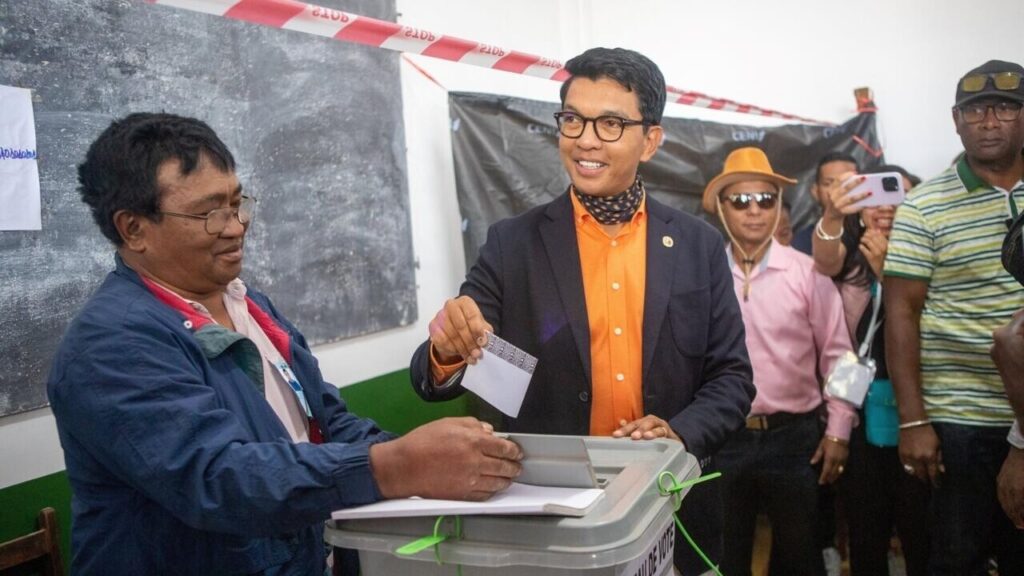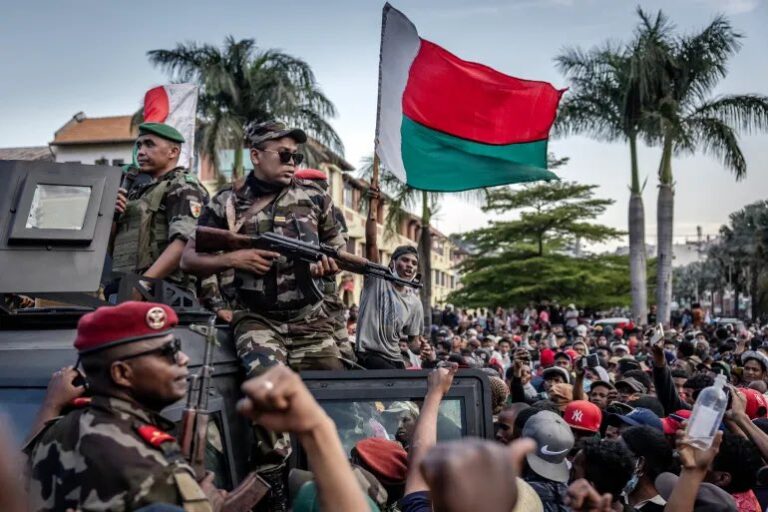Madagascar’s President Andry Rajoelina had ruled since 2019 (and briefly after a 2009 coup) amid chronic governance problems. His government was widely seen as corrupt and unresponsive. By mid‑October 2025, weeks of youth‐led protests demanding better services (especially after widespread electricity and water cuts) had escalated into calls for Rajoelina’s resignation. The protests echoed a “Gen Z” wave seen elsewhere, with demonstrators demanding an end to 16 years of what they called government “inaction,” and even proposing to dismantle institutions (the Senate, electoral commission, constitutional court) they viewed as elitist and ineffective. A key grievance was the monopoly of basic services by Jirama, the state water/electricity company, long accused of corruption and mismanagement. Poverty and youth unemployment were extreme (over 75% of the 30 million population lives in poverty), fuelling public anger. Rajoelina had responded by sacking his prime minister and reshuffling government, but protesters were undeterred. On 11–12 October 2025 the crisis peaked: Rajoelina attempted to dissolve parliament to block an impeachment vote, and in turn a key army unit took over the capital.
Political and Governance Factors
Madagascar’s political institutions were fragile. Rajoelina’s 2023 re‑election was disputed and boycotted by much of the opposition, undermining his legitimacy. Critics charged his administration with cronyism and rights abuses: for example, the president’s close adviser and wealthy businessman M. Ravatomanga was widely accused of corruption and evading taxes. The parliament (including opposition parties) launched impeachment proceedings against Rajoelina, reflecting elite rivalry and a breakdown of compromise. In reaction, Rajoelina tried to bypass the legislature by decree, dissolving the National Assembly on 13 October – a move the Supreme Court (and many legal analysts) deemed constitutionally dubious. This tug‑of‑war underscored deep governance failures: the executive flouted legal constraints, the legislature lacked effective checks, and the security forces eventually fractured between loyalties.
Economic and Social Grievances
Madagascar’s economy was weak and the crisis heightened economic pain. Growth had been stalled for years, and inflation was rising (over 9% by late 2025) while foreign reserves fell sharply. Key exports like vanilla and minerals suffered from global price swings. The U.S. had even threatened high tariffs on Malagasy exports, spurring Rajoelina to seek new investors (for example from the UAE) to diversify the economy. Yet these economic initiatives had little immediate payoff for ordinary people. Youth unemployment and informal work were rampant, and over 80% of Malagasy lacked reliable electricity (only one‑third have power). The sudden cuts in electricity and water in late September were the last straw. Protests framed these as emblematic of a corrupt, clientelist state that taxes citizens but fails to deliver services. The social dimension – a very young population venting frustration – was key. The Gen Z protesters used social media and symbols (notably a pirate‑skull banner from the One Piece anime) to organize and brand their movement as a fight against “authoritarian government”.
Security Forces and Domestic Coup Actors
The immediate trigger of the coup was the defection of part of the military. On 11 October, CPSAT (an elite army administration unit) openly joined the protesters. Its commander, Colonel Michael Randrianirina, announced on radio “We have taken the power” after soldiers supporting the protests seized control of key sites in the capital. CPSAT had been central to Rajoelina’s rise in 2009; its defection was therefore dramatic. Soon after, the parliament (lower house) voted to impeach Rajoelina. Randrianirina declared he was suspending all “democratic institutions” except that same National Assembly (which had impeached the president). Thousands of civilians actually welcomed the CPSAT soldiers into the streets. Footage and reports show armed CPSAT troops packed on trucks alongside cheering demonstrators. The soldiers explicitly refused orders to fire on protesters, escorting them instead. Other branches of the security forces followed: many gendarmes and police refused to act against demonstrators. For example, one CPSAT commander accused military police (the gendarmes) of killing a soldier during clashes. In short, domestic security forces split, with CPSAT and its commander forming the nucleus of the coup.
Motivations of domestic actors: CPSAT’s leadership styled their action as answering the people’s calls, denying it was a true “coup d’etat.” sts, CPSAT may have been enraged by Rajoelina’s loss of popular legitimacy (the youth movement) and rejected orders to use lethal force. The fact that CPSAT had previously helped Rajoelina ascend suggests a personal rift or disillusionment with his rule. Other domestic figures also switched sides: on 12 October the Senate president (a Rajoelina ally) was removed, and CPSAT installed a new army chief (General D. Pikulas) with cabinet approval. A government spokesman quickly condemned CPSAT’s moves as an “illegal and forcible seizure of power,” and termed their takeover an “attempt to seize power”. But many ordinary Malagasy – particularly urban youth – sided with the mutineers, denouncing Rajoelina as a “French stooge” (referring to his dual Malagasy‑French citizenship). In effect, CPSAT and allied officers justified their actions by aligning with popular demands, while Rajoelina’s own guard collapsed.
Role of Foreign Actors
Foreign influence loomed in the background, though no outside military forces intervened openly. France – the former colonial power – played a visible role. French President Macron expressed “great concern” and urged that “constitutional order must be preserved”. France also evacuated Rajoelina: he reportedly flew out on a French military plane to a safe location. (Réunion island.) Air France promptly suspended flights to Madagascar for security reasons. Protesters chanted anti‑French slogans, blaming Rajoelina’s French citizenship and Paris’s historical ties for the misery of Madagascar. (France24 noted protesters jeeringly called the president a “colonial puppet.”) France’s official stance was cautious: at an Egypt summit Macron refused to confirm Rajoelina’s evacuation, saying only that Paris was “concerned”.
:Rajoelina had cultivated ties with Moscow. (He was briefly mayor of the capital in 2009 with Russian support, and Russian assistance helped him win the 2019 election.) During the 2025 unrest, small Russian flags were reportedly seen among some protesters, prompting speculation about covert influence. France’s leader even hinted at “possible Russian interference Russian “sharp power” has expanded in Africa (e.g. private media, political backing), but in Madagascar this has been largely about mining deals and media influence. To date, Russia has neither confirmed nor officially commented on the crisis.
Beijing is Madagascar’s largest trade partner and had significant economic projects on the island (railways, mining, a planned special economic zone, etc.);At the outbreak of unrest Chinese officials made no public statements. However, China’s broad economic presence means it has a stake in stability and may quietly monitor events closely. Chinese media coverage (People’s Daily) emphasized the long‑term partnership and called for dialogue, but did not support any side.
The UAE’s interest appears mainly economic; for instance, Rajoelina had met Emirati real estate tycoons in early 2025 to develop Madagascar’s tourism assets.
Notably, the International Criminal Court (where Rajoelina had cooperated on regional arrests) and external powers like the U.S. did not send forces; instead the U.S. embassy warned its citizens to shelter in place. On the contrary, the crisis briefly strengthened India’s profile: India has a strategic interest in the Indian Ocean, and its new alliance with France (AUKUS+) might view instability in Madagascar warily. But concretely, any outside military influence remained limited to diplomatic gestures and travel advisories.
International Response
The coup drew swift diplomatic reactions. France publicly stressed adherence to the constitution and human rights. President Macron, attending a conference in Egypt, spoke of “great concern” and framed the events as a “standoff” that must respect legal norms. France also halted all Air France flights to Antananarivo. The African Union (AU) urged restraint and dialogue between the military and civilian leaders (as it traditionally does in coups), emphasizing that Madagascar is “not a failed state” but urging calm. Many African governments and regional bodies (East African Community, SADC) echoed calls for constitutional processes – likely to avoid setting a precedent for military takeovers.
The United Nations also intervened indirectly: the UN human rights office condemned the violence against demonstrators, citing at least 22 dead in clashes. It criticized security forces’ “disproportionate use of force” early in the protests. After the coup, the UN and Western governments urged all parties to respect democracy. However, no UN peacekeepers or sanctions were deployed; the situation was treated as an internal crisis (Madagascar was not under UN mission).
Western governments updated travel warnings. The UK Foreign Office advised citizens against travel to Madagascar. The U.S. Embassy likewise warned of instability and said it was “monitoring” the situation. Importantly, many countries (e.g. Canada, Germany) evacuated non-essential staff or citizens; even Mauritius (a neighbor) was alarmed when Rajoelina’s private jet briefly landed there without full clearance. Airlines reacted quickly: Air France suspended all Madagascar flights (citing security), and Emirates followed suit.
No foreign power recognized a new government. Rajoelina continued to claim he was the legitimate president in a safe location, demanding respect for the constitution. CPSAT announced a two-year “transitional period” with military leaders in charge until new elections. However, most outside actors treated the situation as fluid and awaited how Madagascar’s own political actors (parliament, courts) would resolve the standoff.
Implications for Stability, Economy, and Security
Short-term: The coup plunged Madagascar into uncertainty. Economic activity likely contracted as investors and donors paused. For example, the World Bank announced it was postponing planned loans pending clarity on governance. Tourism revenues (a key sector) fell instantly due to flight suspensions and safety fears. Inflation and currency volatility spiked: the Malagasy ariary weakened against major currencies as capital flows slowed. Basic services (already poor) deteriorated further in the short run: fuel imports were disrupted and power rationing worsened because no civilian government was overseeing these needs. On the ground, security forces entered a standoff: CPSAT and allied units guarded key points, while Rajoelina loyalists were sidelined. Street protests continued – hundreds demonstrated in support of the coup against Rajoelina, joined by soldiers – raising the risk of clashes.
Medium-term: Much depends on what follows. If the military transition holds power, Madagascar faces potential isolation: the AU has a policy of suspending governments formed by coups, so Madagascar could temporarily lose its AU seat and face regional sanctions. Some bilateral aid (from France, the EU, and the U.S.) would likely be frozen until civilian rule is restored. In the worst case, prolonged instability could invite greater foreign meddling (e.g. private military contractors or intensified influence from China or Russia), further complicating national sovereignty. However, there is also a chance that a negotiated transition could stabilize the situation. Security forces and business leaders may now push to install a civilian government responsive to youth demands, to prevent a backlash. Rajoelina’s fate remains unresolved: if he ultimately leaves office (forced or negotiated), the polarized politics may reset around a new election or power-sharing deal.
Security Environment: Madagascar has no major insurgencies (unlike some mainland African countries), but the coup raises the specter of violence. A sudden leadership vacuum could embolden local strongmen or criminals; for instance, gangs could exploit the chaos to loot or consolidate control in rural areas. There is also concern about maritime security: Madagascar’s long coastline has seen illicit fishing and trafficking, and a distracted government might struggle to patrol territorial waters. On the other hand, CPSAT has pledged to create a ruling commission including police and military leaders, and possibly a “civilian government” in a few days – suggesting they aim to avoid an outright military junta. International partners (France, EU) may pressure the coup leaders to quickly set a timetable for civilian elections.
Regional and Global Impact: The coup has rattled Indian Ocean geopolitics. Madagascar’s neighbors (Mozambique, South Africa, Mauritius) worry about refugee flows or spillover unrest. The African Union’s reaction will test its enforcement of anti-coup norms. Globally, the crisis underscores a pattern of youth‑driven uprisings in developing countries and could affect foreign policy: France, for instance, is likely to bolster its engagement in Francophone Africa (as seen by Macron’s earlier visit) to prevent similar unrest elsewhere. Economically, Madagascar’s instability may lead foreign investors (from China, India, the Gulf) to reassess projects. For Russia and China, the coup is a reminder of the limits of influence: neither gained a clear foothold, while France remained the decisive external actor.
In sum, Madagascar’s October 2025 coup was rooted in a toxic mix of corrupt governance and grinding economic hardship. It was engineered by a faction of the military responding to public outrage, but it threatens to undo years of fragile progress. The near future will depend on whether Madagascar’s institutions can reassert themselves, whether the army truly hands back power to civilians, and how the international community balances pressure for democracy with the imperative of stability.

More on this story: Madagascar presidential elections show democracy crisis




